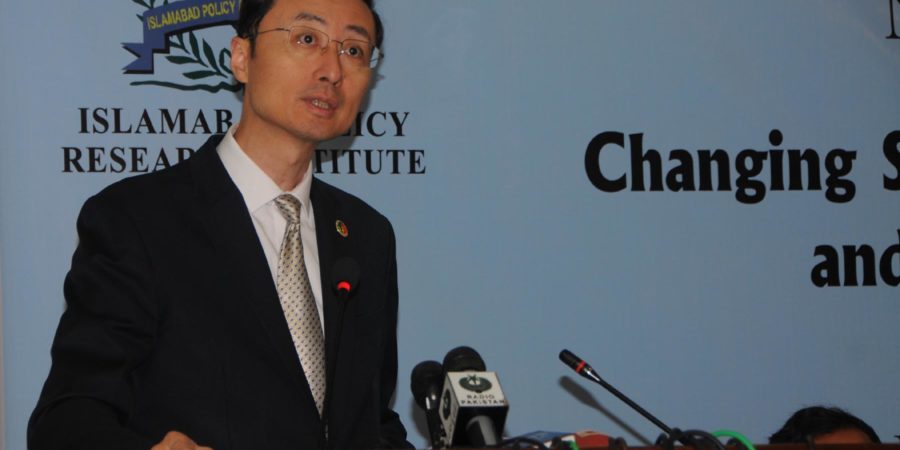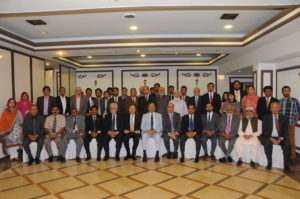Changing Security Situation in South Asia and Development of CPEC

ISLAMABAD(DNA) –There cannot be sustained economic growth and development in an environment riven by deep mistrust and long-standing disputes and conflicts. South Asia needs to follow the Chinese ambitions of mutual development and common interests in order to give impetus to the vision of shared destinies if the region wants to become peaceful and prosperous.
In his inaugural address at the Two-Day National Conference titled ‘Changing Security Situation in South Asia and Development of CPEC’ organised by the Islamabad Policy Research Institute and the Hanns Seidel Foundation, the Federal Minister of Interior and Narcotics Control, Prof Ahsan Iqbal said that through CPEC, South Asia will cease to be the corridor of conflict and become a corridor of cooperation. But for this we need to continue engagement at all levels and remain firmly resolute in our commitment to peace. He said that CPEC is collaborative project between the two most reliable partners in the world,– Pakistan and China – especially given their time-tested friendship. According to him, think- tanks, academics, business leaders around the globe are engaged in discussing CPEC which reflects its true potential and importance. But while South Asia’s population and geograpy can be a boon towards progress, this also remains one of the most heavily militarized regions, with two nuclear states. South Asians needs to come together and create an enabling environment to embrace the security and well-being which CPEC is offering. Under Vision 2025, the Government of Pakistan has envisaged the country as a hub of trade, commerce and connectivity. ‘Critics may argue that the Government is just building roads, but in reality everything whether it is health services, education, or business needs better connectivity without which nothing is possible. In the past, it took 2 days to travel from Gwadar to Quetta, its own provincial headquarter, and now with the expressway, it takes 8 hours’, he remarked. Pakistan must learn from China which gave zero space to internal conflicts and focused on political and economic stability. The Federal Minister urged the need to stop focusing on the voices and harbingers of doom and gloom who are trying to malign development projects like CPEC, and to look ahead with optimism and hope for a better and brighter future for Pakistan and the Pakistani nation.
In his keynote address, H.E. Mr. Sun Weidong, Ambassador of People’s Republic of China to Pakistan said the China-Pakistan Economic Corridor as part of the Belt and Road Initiative provides an important network and platform to achieve win-win cooperation in Asia and beyond. It is the best reflection of the Silk Road Spirit, featuring peace, cooperation, openness, inclusiveness, mutual learning and prosperity. He said that CPEC is crucial pilot project of the Belt and Road initiative since it has become a leading demonstration in the promotion of B&R as it now enters full implementation stage, making smooth and satisfactory progress. The Ambassador shared that CPEC has cross-border consensus from people of both sides because it follows principles of mutual partnership and peaceful development. He explained that CPEC follows ‘a new type of international relations based on win-win cooperation by forging partnerships of dialogue with no confrontation, on the basis of friendship rather than alliances. China wants to actively promote policy synergies rather than Cold War doctrinal divisions,’ he stressed. Providing data on China’s future contributions to the world in the next five years, he said that his country is expected to import goods worth USD 8 trillion, attract foreign investment worth USD 600 billion, and at the same time will be investing USD 750 billion in other countries. ‘China and South Asia with their collective population of 3 billion people will be the largest emerging market in the world and with the blueprint of CPEC finally becoming a reality with unprecedented development in four years, the Early Harvest projects are now reaching fruition and growing like bamboo shoots across the land of Pakistan,’ he concluded.
Welcoming delegates to the conference, President of IPRI, Ambassador (R) Abdul Basit said that peace is sine qua non for sustainable development, and Pakistan has always strived for and continues to strive for normal relations with all its neighbours. ‘Our First Neighbour Policy is driven by the national desire to move from conflict management to conflict resolution. History tells us that we cannot build a sustainable and balanced regional cooperative framework on unpredictable and tenuous bilateral relations.’ He hoped that the deliberations would lead to improved understanding of the changing security situation in South Asia and help create synergies for a peaceful region.
In his opening remarks, Mr. Omer Ali from the Hanns Seidel Foundation (HSF), co-organiser of the conference, pointed out that CPEC has put Pakistan in a much stronger negotiating position globally, and it is likely to increase direly needed cooperation with other neighbouring countries since the Corridor will raise many secluded layers of society from abject poverty.
In the session on ‘Geopolitics of the Region and Development of CPEC’ chaired by Ambassador (R) Inamul Haque, Dr. Farhan Hanif Siddiqi from Quaid-i-Azam University reviewed the geo-politico-economic trends of South Asia vis-a-vis CPEC. He pointed out that the world is witnessing a ‘cult of the offensive’ at the geopolitical level and in the midst of such seemingly intensifying agendas, CPEC presents a radical break and opportunity to steer South Asia in the direction of mutual cooperation through economic interlinkages. He stressed that South Asia cannot afford to continue on its path of confrontation and hostility if it wants to become a powerful economic bloc.
Professor Dr. Syed Rifaat Hussain from National University of Sciences and Technology (NUST) was of the view that South Asia is no longer a subordinate system and has gained greater autonomy. Yet, notwithstanding its growing strategic weight, it is still segmented. The main cause of this lack of integration is the dominant position of India in South Asian power structure. Dr Rifaat opined that India’s rise to power has been facilitated by the United States which has encouraged New Delhi to play the role of a balancer to China since the latter’s peaceful rise has been viewed with great alarm by Washington. ‘It is not a coincidence that India and the US are the only two countries that have publicly opposed CPEC,’ he remarked. According to him, China presents India with a twofold problem: material and ideational. With a GDP of approximately 11 trillion dollars which is growing at about 8 per cent per year, the Chinese economy is bigger and expanding more rapidly than India’s 3 trillion dollar economy. The Indians fear that as a result of its superior and sustained economic growth China would amass an overwhelming preponderance of power that would frustrate India’s long-standing desire to play the role of a regional hegemon in South Asia. At the ideational level, China’s stupendous economic growth as a result of which over 600 million Chinese people have been lifted out of poverty presents a challenge to India where 56 per cent of its population remains mired in abject poverty. ‘To promote their overlapping interests in containing China, India and the US have joined hands in the form of Indo-US axis,’ he said.
Discussing the Chinese perspective about South Asian security and CPEC, Dr. Fazal-ur-Rahman from the National Defence University (NDU) cautioned that Pakistan should not expect Chinese support on issues that go beyond Pak-China relations, and to be mindful that geoeconomic projects are likely to have geopolitical consequences.
In the session on ‘Impact of CPEC on the National Security of Pakistan’ chaired by Professor Dr. Syed Rifaat Hussain, speakers quelled apprehensions that China may have come to Pakistan with a colonial hegemonic agenda and stressed that Beijing’s vision lies in seeing shared global prosperity and sustainable development through enhanced people-to-people contact.
In his presentation on ‘CPEC: Pakistan’s Vision of Maritime Security’ Adm (R) Asaf Humayun, HI (M), Former Director General, National Centre for Maritime Policy Research at the Bahria University, Karachi outlined that the issues surrounding protection and use of oceans are transboundary in nature and require strong cooperation. He cautioned that the development of CPEC and use of Gwadar port will increase Pakistan’s maritime security responsibilities and challenges, especially those related with sea-based nuclear weapons; the rise of India as a maritime power; non-traditional security threats like climate change, smuggling, cyber warfare and piracy; ISIS presence in littoral states; and threats of subversion. He recommended that to counter these challenges, Pakistan needs to use CPEC as in inclusive forum to alleviate poverty in the country; pursue maritime security cooperation but be prepared to meet enemy designs; and establish a naval harbour at Gwadar port or in its vicinity, so that maritime security can be augmented for CPEC.
Professor Dr. Muhammad Masoom Yasinzai, Rector of the International Islamic University speaking on ‘CPEC: An Engine to Human Resource Development in Pakistan’ shared that Pakistan has a weak labour market and lacks quality vocational training centres since the Higher Education Commission has not succeeded in building bridges between academia and industry. He recommended that Pakistan’s institutions of higher learning need to become more relevant and update their syllabi and even faculty capacities to bridge the human capacity gaps in areas like civil engineering especially railways and tunnels, electrical & instrumentation engineering, architectural planning, supply chain management & business incubation experts, transportation & logistics, industrial electronics, and energy.
Professor Dr. Ashfaque Hasan Khan, Dean, School of Social Sciences, National University of Sciences and Technology in his presentation pointed out that while India can scuttle the benefits of CPEC cooperation through Afghanistan, it can be neutralised by reinvigorating the Quadrilateral Transit Agreement signed in 1995 by China, Pakistan, Kazakhstan and the Kyrgyz Republic. In his views, CPEC – CAREC cooperation can be a game-changer for approximately 2 billion people in the region. However, he also stressed that Pakistan’s leadership needs to be serious in implementing projects, and to focus on human capital development, particularly towards the Institutions of Higher Learning. He suggested that a pool of skilled manpower in the country in general and Balochistan in particular needs to be generated. ‘A crash programme needs to be launched to provide requisite skills to the people of Gwadar and Balochistan as a whole for promoting social stability in the country. It is also important to build capacity of Pakistan’s bureaucracy to handle multi-dimensional projects; and set up a CPEC Development Authority comprising civil and military officers for better coordination, smooth and timely execution and completion of projects’, he concluded.
The conference will conclude tomorrow with the keynote address by the Minister of Defence Engr Khurram Dastigir Khan.
Related News

Agreement signed for reviving local cotton sector
ISLAMABAD, JUL 10 (APP/DNA):Minister for National Food Security and Research, Rana Tanveer Hussain, led aRead More

PPP Senator Sherry Rehman pays tribute to veteran Journalist Zubeida Mustafa
ISLAMABAD, JUL 10 (APP/DNA):Vice President of the Pakistan Peoples Party (PPP), Senator Sherry Rehman, hasRead More



Comments are Closed